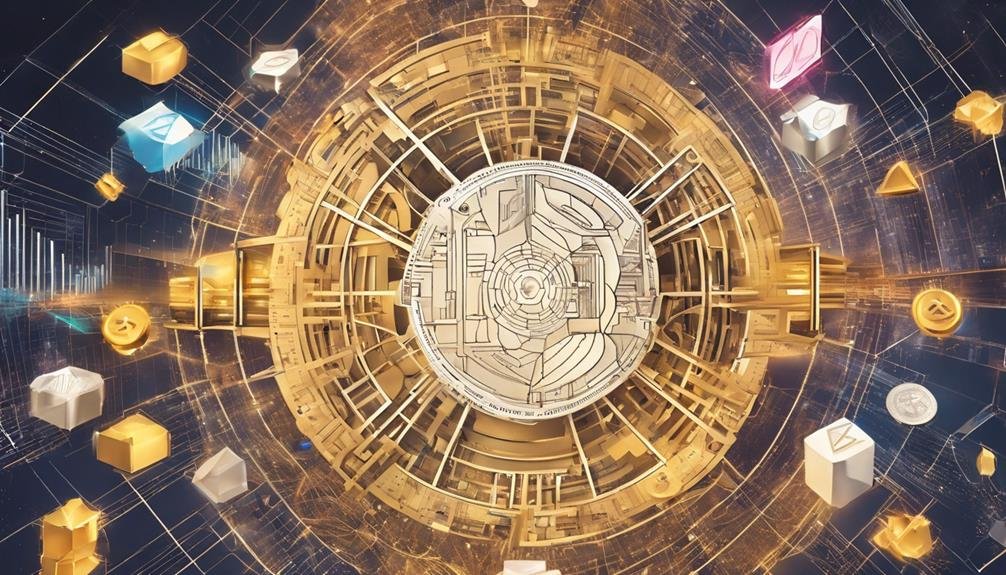In 2024, DeFi exchanges will witness seven pivotal trends. Interoperability enhancements will enable seamless asset transfer across blockchains, fostering financial inclusivity. Decentralized perpetual futures adoption, like on dYdX, will revolutionize trading strategies. Decentralized derivatives, led by platforms such as GMX, will reshape risk management and investments. DEX and AMM advancements, like Uniswap V3 and Curve Finance, will enhance liquidity and reduce risks.
Integration of token standards, such as ERC-20, will boost token liquidity and trust. The rise of crypto insurance solutions, exemplified by Nexus Mutual and Bridge Mutual, will bolster confidence in DeFi. Inclusive trading experiences will democratize access to digital assets, promoting a diverse and dynamic trading ecosystem. Discover more about these critical trends that shape the future of decentralized finance.
Brief Overview of 7 Key Decentralized Finance Exchange Developments 2024
- Enhanced interoperability across DeFi exchanges.
- Decentralized perpetual futures trading adoption.
- Evolution of decentralized derivatives for risk management.
- Advancements in DEX and AMM technologies.
- Integration of token standards for efficiency and liquidity.
Interoperability Enhancements
The evolution of interoperability in DeFi exchanges heralds a paradigm shift towards a more interconnected and accessible financial ecosystem. Projects like Wormhole are at the forefront of enhancing interoperability across various blockchains, enabling seamless asset transfer and communication. These advancements are vital in allowing easy movement of assets and information between different networks, ultimately fostering a unified financial landscape open to all participants, thereby promoting financial inclusivity.
Decentralized platforms leverage interoperability to create a more connected and efficient financial environment, providing opportunities for improved liquidity and asset accessibility. The progress in interoperability signifies a pivotal moment in the DeFi space, facilitating smooth communication between disparate networks and paving the way for innovative financial solutions previously hindered by siloed systems. As interoperability advances, it promises a future where financial services are more interconnected, efficient, and inclusive for all users.
Decentralized Perpetual Futures Adoption

Amidst the evolving landscape of decentralized finance, the embrace of decentralized perpetual futures marks a significant advancement in trading possibilities. Platforms like dYdX offer traders the opportunity to engage in decentralized perpetual futures, revolutionizing the derivatives market. By providing a decentralized environment for traders to hedge and speculate, dYdX is at the forefront of this innovative trend.
Decentralized perpetual futures break away from the limitations imposed by centralized exchanges, offering traders new avenues for diversification and flexibility in their trading strategies. The adrenaline of trading without traditional red tape becomes a reality through platforms like dYdX, where traders can explore a wide range of investment opportunities.
This adoption of decentralized perpetual futures signifies a paradigm shift in the derivatives market, empowering traders with enhanced risk management tools and investment strategies outside the traditional financial institutions. As more traders recognize the benefits of decentralized perpetual futures, the landscape of the derivatives market continues to evolve, creating new possibilities for the future of trading.
Evolution of Decentralized Derivatives

In light of the transformative impact of decentralized perpetual futures, the evolution of decentralized derivatives continues to reshape the financial landscape by offering enhanced risk management and diversified investment opportunities through platforms like the GMX project. Decentralized derivatives, a cornerstone of DeFi, operate independently from traditional financial institutions, ushering in a new era of investment strategies.
The GMX project stands out for revolutionizing the derivatives market, providing traders and investors with innovative avenues for managing risks and exploring diverse investment options. Platforms such as GMX offer traders flexibility and diversification in trading choices, freeing them from the limitations of centralized exchanges. By introducing a paradigm shift in derivatives trading, the GMX project empowers users to engage in hedging and speculative activities in ways previously inaccessible.
This evolution signifies a fundamental change in how derivatives are approached, highlighting the importance of risk management and the transformative potential of decentralized derivatives in the financial sector.
Advancements in DEX and AMM

The DEX and AMM technologies advancements are revolutionizing the DeFi landscape through enhanced liquidity pools, automated market makers, and improved user experience. These innovations are reshaping how users interact with decentralized exchanges, providing increased efficiency and accessibility in trading. The continuous evolution of these platforms showcases a commitment to pushing the boundaries of financial decentralization and fostering a more inclusive ecosystem for all participants.
Enhanced Liquidity Pools
Advancing the domain of decentralized exchanges (DEX) and automated market makers (AMM), the evolution of enhanced liquidity pools has revolutionized the DeFi landscape with increased capital efficiency and reduced slippage risks. Platforms like Uniswap V3 have introduced concentrated liquidity, optimizing capital usage and benefiting traders by minimizing slippage. Curve Finance specializes in stablecoin trading, offering low slippage and competitive fees and enhancing the trading experience.
SushiSwap’s Kashi platform allows for the creation of customized lending pairs, further improving liquidity provision in the market. Bancor’s v2.1 protocol simplifies liquidity provision with single-sided AMM pools, reducing impermanent loss risks. Balancer’s customizable pools also enable multiple token deposits, enhancing capital allocation and liquidity provision across various assets.
Automated Market Makers
Pioneering innovations in decentralized exchanges and automated market makers are reshaping the landscape of DeFi trading, setting new standards for accessibility and efficiency. Uniswap Labs, a key player in the blockchain space, continues to spearhead advancements in DEX and AMM technology, revolutionizing decentralized trading. By operating without centralization, these platforms provide an efficient, efficient, user-friendly, and inclusive financial environment.
The developments in DEX and AMM redefine DeFi trading standards and streamline financial activities, making them more accessible to a broader audience. With these tech innovations, the future of financial exchanges is being redefined, simplifying complex DeFi trading processes and setting a high bar for the industry.
Improved User Experience
Innovating user interaction within decentralized exchanges and automated market makers is essential for enhancing the DeFi trading experience. Advancements in DEX and AMM technologies play a pivotal role in reshaping the user experience landscape in decentralized finance. Here are key points to ponder:
- Uniswap Labs: Leading the way in DEX and AMM innovation.
- Efficiency and User-friendliness: Core principles driving decentralized exchanges for a seamless user experience.
- Global Accessibility: DEX and AMM advancements are democratizing financial trading worldwide.
- Continual Improvements: Tech experts tirelessly enhance DEX and AMM functionalities for streamlined transactions.
These developments underscore the commitment to making DeFi trading more efficient, user-centric, and accessible globally.
Integration of Token Standards

Integrating token standards, such as ERC-20 and ERC-721, is paramount in DeFi exchanges to ensure seamless interoperability and enhanced token issuance processes. These standards facilitate cross-chain compatibility and boost token liquidity and trading efficiency within decentralized platforms. By adhering to standardized token formats like ERC-20, DeFi exchanges can promote trust, security, and widespread adoption among users seeking reliable token transfer mechanisms.
Token Standard Adoption
Guaranteeing smooth token interoperability and effective token management within DeFi exchanges, integrating token standards such as ERC-20 and ERC-721 has become a cornerstone for enhancing the functionality and security of decentralized exchange operations.
- ERC-20 and ERC-721: Widely adopted for token creation and interoperability.
- Compatibility: Standards like ERC-20 ensure seamless token transfers across DeFi platforms.
- Crucial Role: Token standards define attributes, functionalities, and interfaces in the DeFi ecosystem.
- Efficient Management: Adoption of standards facilitates trading and utilization in decentralized exchanges.
Token standardization through ERC standards enhances liquidity, security, and interoperability. It streamlines the DeFi exchange landscape, setting a foundation for the future of decentralized finance.
Interoperability Enhancements
Amidst the evolving landscape of decentralized finance, the seamless integration of token standards like ERC-20 and ERC-721 is a pivotal mechanism driving interoperability enhancements across DeFi platforms. These standards facilitate efficient cross-chain compatibility and multi-chain support within decentralized exchanges. By adhering to ERC-20 and ERC-721 protocols, DeFi platforms guarantee standardized token creation and transferability, promoting a more interconnected and efficient decentralized financial environment.
Integrating these token standards enhances liquidity and improves accessibility for users operating across different blockchain networks. Ultimately, incorporating ERC-20 and ERC-721 standards fosters a cohesive ecosystem where interoperability thrives, paving the way for seamless transactions and interactions within the DeFi space.
Rise of Crypto Insurance Solutions

Experiencing exponential growth, crypto insurance solutions like Nexus Mutual and Bridge Mutual are revolutionizing risk management in the DeFi space. These platforms offer essential insurance coverage for participants in decentralized finance, ensuring protection against various risks and unexpected events. The rise of DeFi insurance solutions signifies a shift towards a more secure and reliable ecosystem for users. Key points to note include:
- Nexus Mutual: Total Value Locked (TVL) surged from $4 million in July 2020 to over $500 million in February 2022.
- Bridge Mutual: Provides peer-to-peer insurance coverage for stablecoins and smart contracts in the DeFi ecosystem.
- Safety Net: Crypto insurance solutions act as a safety net, enhancing trust and confidence in the DeFi space.
- Decentralized Operation: DeFi insurance contracts operate in a decentralized manner, ensuring transparency and security for users.
As these platforms gain popularity and trust within the DeFi community, the importance of crypto insurance solutions is set to grow further, shaping the future of risk management in decentralized finance.
Inclusive Trading Experiences

DeFi exchanges aim to provide inclusive trading experiences for users globally by promoting financial inclusivity and democratizing access to investment opportunities. These platforms prioritize user-friendly interfaces and intuitive designs to guarantee accessibility and usability for individuals of varying backgrounds.
By offering a diverse range of digital assets and tokens, DeFi exchanges play an essential role in fostering financial inclusivity and expanding investment accessibility. The attraction of a broad spectrum of investors and traders to these platforms contributes to creating a vibrant and dynamic trading ecosystem.
Moreover, features such as low fees, fast transaction speeds, and seamless onboarding processes further enhance the inclusivity of trading experiences on DeFi exchanges. These elements not only streamline the trading process but also lower barriers to entry for individuals looking to participate in the decentralized finance space. Overall, the emphasis on inclusivity within DeFi exchanges reflects a dedication to democratizing finance and empowering users worldwide to engage in the burgeoning digital asset market.
Frequently Asked Questions
What Is the Defi Outlook for 2024?
The DeFi outlook for 2024 reflects a landscape of dynamic innovation, regulatory challenges, and promising investment opportunities. To capitalize on the sector’s growth potential, stakeholders must navigate evolving trends in DeFi protocols, decentralized exchanges, and novel financial products.
What Are the Top 3 Defi Projects?
What defines the top DeFi projects? Leaders emerge through innovative yield farming strategies, governance tokens, robust liquidity pools, and staking mechanisms. These projects exemplify resilience, adaptation, and sustainable growth in decentralized finance.
What Is the Future Growth of Defi?
The future growth of DeFi is poised for further expansion, which is marked by regulatory challenges, continuous innovation in protocols, and evolving user adoption trends. These factors will shape the landscape of decentralized finance in the coming years.
How Big Is the Defi Market in 2028?
The DeFi market is projected to reach a substantial market size of $180 billion by 2028, driven by an exponential adoption rate. However, this growth may need to be improved by regulatory challenges that could impact the sector’s expansion.
Conclusion
In summary, the decentralized finance exchange landscape is set for significant advancements in the upcoming years, with trends such as interoperability enhancements, decentralized perpetual futures adoption, and the emergence of crypto insurance solutions shaping the industry. As decentralized exchanges continue to evolve and integrate new technologies, the future of DeFi trading looks promising. Will these trends revolutionize the way we trade digital assets? Only time will tell.










